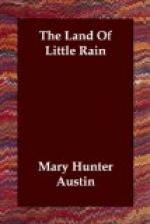It was once in roving weather, when we found him shifting pack on a steep trail, that I observed certain of his belongings done up in green canvas bags, the veritable “green bag” of English novels. It seemed so incongruous a reminder in this untenanted West that I dropped down beside the trail overlooking the vast dim valley, to hear about the green canvas. He had gotten it, he said, in London years before, and that was the first I had known of his having been abroad. It was after one of his “big strikes” that he had made the Grand Tour, and had brought nothing away from it but the green canvas bags, which he conceived would fit his needs, and an ambition. This last was nothing less than to strike it rich and set himself up among the eminently bourgeois of London. It seemed that the situation of the wealthy English middle class, with just enough gentility above to aspire to, and sufficient smaller fry to bully and patronize, appealed to his imagination, though of course he did not put it so crudely as that. It was no news to me then, two or three years after, to learn that he had taken ten thousand dollars from an abandoned claim, just the sort of luck to have pleased him, and gone to London to spend it. The land seemed not to miss him any more than it had minded him, but I missed him and could not forget the trick of expecting him in least likely situations. Therefore it was with a pricking sense of the familiar that I followed a twilight trail of smoke, a year or two later, to the swale of a dripping spring, and came upon a man by the fire with a coffee-pot and frying-pan. I was not surprised to find it was the Pocket Hunter. No man can be stronger than his destiny.
SHOSHONE LAND
It is true I have been in Shoshone Land, but before that, long before, I had seen it through the eyes of Winnenap’ in a rosy mist of reminiscence, and must always see it with a sense of intimacy in the light that never was. Sitting on the golden slope at the campoodie, looking across the Bitter Lake to the purple tops of Mutarango, the medicine-man drew up its happy places one by one, like little blessed islands in a sea of talk. For he was born a Shoshone, was Winnenap’; and though his name, his wife, his children, and his tribal relations were of the Paiutes, his thoughts turned homesickly toward Shoshone Land. Once a Shoshone always a Shoshone. Winnenap’ lived gingerly among the Paiutes and in his heart despised them. But he could speak a tolerable English when he would, and he always would if it were of Shoshone Land.




